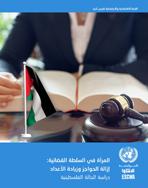The presence of women in the judiciary in the State of Palestine has increased over the past years, with women now comprising almost 18 per cent of Palestinian judges. The State of Palestine is the only Arab country where women have been appointed as judges in Islamic courts, where matters related to personal status such marriage, divorce and child custody are adjudicated. Women have also been appointed to military courts, an exclusively male judicial branch until recently. Despite these advances, however, strong barriers to women’s entry and career progression in the judiciary remain unaddressed. Women are still excluded from certain senior and “sensitive” judicial positions (such as the Constitutional Court) and are starkly underrepresented in fields such as military and criminal justice. Overall, women’s presence in the judiciary remains low and needs to be improved.
Specific barriers to women’s full and equal presence in all branches of the judiciary are highlighted in the report. Societal stereotypical perceptions of the respective roles of men and women continue to play a role, and chief among those is the expectation that women must act as the primary caretakers in their households, which can hinder their career progression. Stereotypical perceptions are compounded by institutional barriers to women’s progress in the judiciary, including gender bias towards men in recruitment to senior and “sensitive” positions. In response to these barriers, the paper proposes a series of policy recommendations to ensure women’s equal presence in the judiciary. The paper is part of a series of reports on women in the judiciary in several Arab States, conducted in the framework of a regional study produced by ESCWA in partnership with the International Commission of Jurists (ICJ) and the Office of the United Nations High Commissioner for Human Rights (OHCHR). The paper is based on analysis of relevant legal, policy and administrative frameworks complemented by focus group and individual discussions with female and male lawyers, judges, prosecutors, and court officials.






